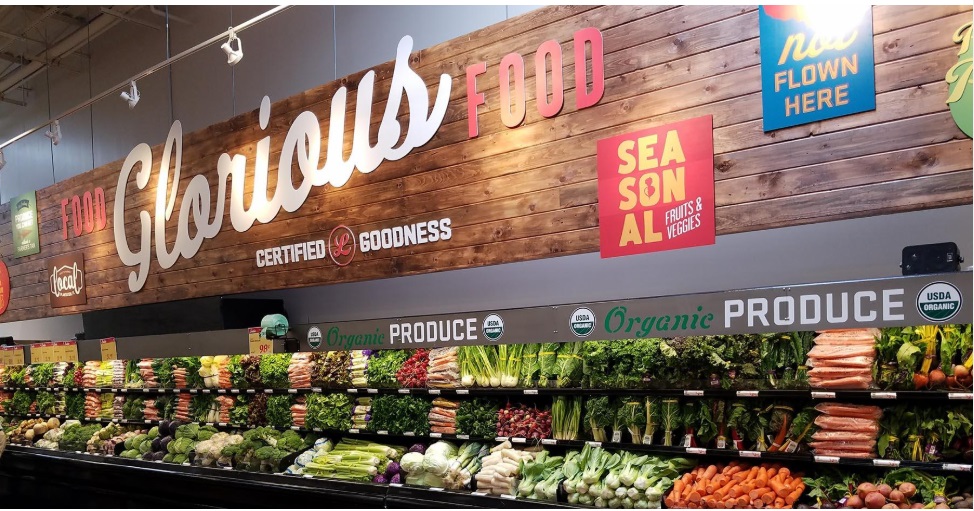
Alternative concept grew quickly but struggled, sources say.
By Jon Springer on Dec. 05, 2019
The Kroger Co., which invested in the upstart natural foods chain Lucky’s Market in 2016 and more than doubled its store base, said it would divest the chain and take a $238 million charge on the investment.
The deal for Niwot, Colo.-based Lucky’s grew out of Kroger’s interest in a vehicle providing value-priced, on-trend food as well as a potential avenue to expand in Florida, where it did not previously have stores. Kroger said the decision to divest followed a portfolio review. Of the impairment charge, $131 million will be attributable to the Cincinnati-based grocer.
Lucky’s had 17 stores at the time of Kroger’s investment in April 2016 and has since grown to 39 stores, most of them in Florida. The stores are notable for an emphasis on value-priced food merchandised in the style of a farmers market, along with an extensive prepared foods offering and millennial-friendly marketing approach that emphasized “organic for the 99%.” It featured in-store beer and juice bars, scratch-made meals and store-smoked bacon, as well as workers in mechanic-style coveralls and garage-door entrances allowing for outdoor merchandising.
Kroger’s new corporate slogan, “Fresh for Everyone,” can be seen as recalling Lucky’s approach. Earlier this year, the chain began carrying Kroger’s Simple Truth brands.
Kroger officials in a recent investor conference said the company would consider asset pairing “where appropriate” as a means to achieve returns on capital investment. The company aims to ensure projects return capital of more than 11%.
In an earnings conference call this week, Kroger officials suggested Lucky’s wasn’t meeting that goal. “The amount of investment that it would take for Lucky’s to be a meaningful contributor to Kroger overall, and the efforts that it would take, we just didn’t think it created a good return for the investments that were needed to be made,” CEO Rodney McMullen said.
But the divestment also reflected wider trends of conventional retailers at last catching up to the smaller, farmer’s market-style stores that enjoyed such a strong run in recent years. Two of Lucky’s counterparts in that space, Sprouts Farmer’s Markets and Fresh Thyme, are each easing growth this year, and both companies recently replaced their CEOs. Sprouts has seen comps slow considerably while its new management plots a new strategy.
These moves came as their larger rivals—including Kroger and Walmart—moved to improve presentation and pricing in fresh foods.
“We do believe that as we get better connecting on fresh and continue to evolve the strategy around natural and organic, obviously, we’re providing a far more comprehensive level of experience for that customer than ever before, and continue … to build out the strategy around freshness and connecting with our loyal customers,” Kroger CFO Gary Millerchip said.
“We do believe that there’s still a role for the small format store,” he added. “I think it’s certainly proven. And I think it’s still probably to be proven in the industry about what is the right model for a smaller format store and how do you make that economic model work.”
What’s Next for Lucky’s
Lucky’s was founded in Boulder, Colo., by the husband and wife team of Bo and Trish Sharon, who had restaurant backgrounds and expanded in its early years behind stores in college towns. Its officials welcomed the Kroger investment as a means to lower its cost of goods and achieve market densities—focusing almost all of its new stores in Florida, where the conventional supermarket field is dominated by Publix but where smaller, alternative concepts saw opportunity.
In addition to Lucky’s, The Fresh Market, Earth Fare and Sprouts Farmers Market have also crowded the Sunshine State with nontraditional food offerings in recent years. Publix, in the meantime, relaunched its dormant GreenWise concept in what sources saw as a defensive move.
Kroger did not report financial details of Lucky’s, nor did it disclose the size of its initial investment. And although the Planned Grocery website indicates the chain has as many 14 stores under construction, real estate sources told WGB recently that Lucky’s had slowed its flow of new deals. A lack of financial information about the concept may have resulted in developers charging higher rents, said Mark Thompson, founder of Grocery Anchored, an Orlando-based real estate services firm.
Other sources said Lucky’s had “struggled” as a business.
“It just hasn’t done what [Kroger] thought it would do,” Neil Stern, managing partner with McMillan Doolittle, Chicago, told WGB. “It’s a nice store, but the economic model just did not work.”
Stern said Lucky’s might struggle to find a strategic buyer. “There are players out there, but everyone has issues,” he said, noting for example that Sprouts is reevaluating its growth plans under new management, and The Fresh Market has been paring stores as it attempts a turnaround. “There’s always private equity that could come in and work with the founder, so that’s a possibility. Publix is always there, but this isn’t the kind of acquisition they typically make.”
https://www.winsightgrocerybusiness.com/retailers/kroger-calls-it-quits-luckys